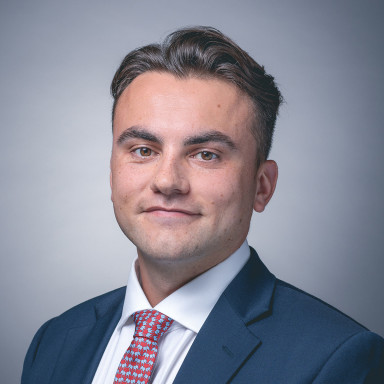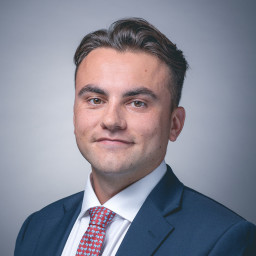Eidelman and Forey have plenty of experience investing across emerging markets
JPMorgan have invested in a highly resourced team to support the managers
Long-term performance has been strong, but it has struggled more recently
This fund is on our Wealth Shortlist of funds chosen by our analysts for their long-term performance potential
How it fits in a portfolio
The JPMorgan Emerging Markets fund aims to deliver capital growth over the long term. It invests in growing businesses across a diverse range of emerging economies such as China, India, Taiwan, and Korea. It’s important to note that whilst emerging markets offer lots of opportunity for investors, they're higher risk and typically more volatile than developed markets.
Given its focus on growth, the fund could work well alongside more value orientated Asia and emerging market funds. It could also be blended with other funds that focus on developed markets as part of a globally diversified portfolio.
Manager
Leon Eidelman first joined JPMorgan in 2002 and became co-manager of this fund in 2013. He was appointed lead manager in 2016 and has final responsibility over which companies make it in and out of the fund. He also makes use of the input and challenge provided by his co-manager, Austin Forey.
Austin Forey is a seasoned emerging markets investor and has managed money in emerging markets since 1994. His career at JPMorgan began in 1988 during which he’s built up an extensive knowledge of global markets. His analyst career focussed on the engineering, financials, and property sectors. He served as deputy head of UK research before joining the emerging markets team in 1994.
Both managers also run or contribute to other emerging markets portfolios at JPMorgan, using the same core process throughout. Given the large degree overlap across these strategies, we think they have plenty of time to comfortably manage these responsibilities.
The managers benefit from a well-resourced team of around 140 individuals across nine countries. From Seoul to Mumbai, they have eyes in most corners of the market. We think this is invaluable given the vast range of countries, cultures, and companies within their investable universe.
Process
The managers aim for the fund to perform better than the broader emerging stock market by investing in high-quality companies that can sustain earnings growth over the long term. They believe most investors underestimate the potential for share price growth in companies that can grow their earnings at a sustainable pace over a long period of time. This could help them buy company shares at a reasonable price and hold on to them as they grow their profits, and hopefully their share prices, over the long run.
As lead manager, Eidelman oversees how the fund is constructed. He also leans on the wider team of analysts who carry out extensive research and provide new ideas. They typically travel across the region to visit companies and gain insight into what's happening in different economies.
The team looks for quality companies with the aim of calculating how much a company will grow its earnings over the next five years. They consider the financial strength of a business, the quality of the management team and the decisions it takes, and the level of corporate governance. Other factors, such as the dividends a company pays and how changes in a country's currency might impact a business, are also considered.
This whittles a large universe down to a final portfolio of around 60-100 companies. Geographically, the managers find most opportunities in China, India, and Taiwan, that said they do invest less than the benchmark here. In contrast, they invest more in countries like Mexico and Brazil.
The managers mainly invest in large, established firms, but also invest in some medium-sized companies with greater growth prospects. They also have the flexibility to invest in higher-risk smaller companies, though they have tended not to venture in this area of the market.
When making any investment, they do so with the long term in mind. As a result, they don’t tend to make changes very often. However, they have found plenty of interesting opportunities over the past year. For example, they invested in WEG, a Brazilian electrical engineering company after being attracted to its growth potential and competitive positioning. Other new purchases included Shoprite, the South African food retailer and SK Hynix, the South Korean semiconductor company.
In contrast, they sold several companies including Meituan, the Chinese shopping platform, Brazilian investment manager XP Inc and B3 S.A., in the Brazilian stock exchange. Taiwan Semiconductor Manufacturing Company (TSMC), their largest holding was also trimmed following a strong period of performance.
Culture
JPMorgan is one of the world's biggest asset managers. It has investment professionals based all over the world, and the team behind this fund can tap into this experience and local knowledge. The group is home to strong emerging markets offering and the team is stable, with low turnover among senior members.
Eidelman and Forey have remained loyal to the group and spent their entire careers at JPMorgan, and we think they are dedicated to the emerging markets group. We view it positively that the managers are incentivised to focus on long-term performance.
ESG Integration
JPMorgan committed to integrate Environmental, Social and Governance (ESG) factors into their investment processes for active funds in 2016 and ESG is now a foundation for investment decisions across the firm. JPMorgan funds take a variety of different approaches, from quantitively scoring companies on a variety of ESG measures to help with portfolio construction, to more qualitative analysis achieved through fundamental research and company meetings. All fund managers have access to the central Sustainable Investing team, as well as thematic research and analytics, which focus on climate change and carbon transition.
Investment teams are required to demonstrate their progress on integrating ESG to a working group of senior managers from across the business and the Sustainable Investing team. Their progress is measured against a 10-point scoring system and must satisfy several conditions before it can achieve ‘ESG accredited’ status.
If the strategy does not meet this threshold, the investment team in question will need to incorporate the feedback from the working group and reapply to restart the review process. Once approved, teams must seek recertification every three years, and are subject to ongoing monitoring. We like this objective approach to internal ESG accreditation.
The firm has detailed voting policies which are specific to each region they invest in and account for local customs. Investment teams and investment stewardship specialists in the relevant region are responsible for implementing those policies, based on their deep knowledge and experience of the country, sector and company. A detailed fund-by-fund and company-by-company voting record is available on the JPMorgan website, although voting rationale is not provided. Fund managers also regularly engage with the companies they invest in, and there are a number of case studies on their website and in their annual Investment Stewardship report.
Cost
This fund usually has an ongoing annual charge of 0.83%, but we've secured HL clients an ongoing saving of 0.25%. This means you pay a net ongoing charge of 0.58%.
The fund discount is achieved through a loyalty bonus, which could be subject to tax if held outside of an ISA or SIPP. The HL platform fee of up to 0.45% per year also applies.
Performance
Austin Forey and Leon Eidelman have delivered strong returns to long-term investors. Over the past decade, the fund has returned 78.12%* versus 62.11% for the IA Global Emerging Markets sector average. They are also ahead of their benchmark over this period.
The fund’s performance has struggled more recently though. Over the past 12 months (to end of November), the fund has fallen by 2.34% versus a 0.28% increase for the IA sector average. Stock selection has been a headwind for returns, particularly within China and India which account for a significant amount of their portfolio.
Some of the key detractors included EPAM Systems, the Belarus IT company and JD.com, the Chinese e-commerce business. HDFC, India’s largest private bank which is one of their largest investments was also a source of pain, but the managers remain confident in its long-term prospects.
It wasn’t all bad news though. Their investments in companies such as NU Holdings, the Brazilian bank, TSMC and MercadoLibre, the Argentine online marketplace all delivered strong returns over the period.
Over the long term, we remain confident in the managers ability to outperform. Although, investors should be aware that emerging markets are volatile and investment styles can come in and out of favour.
Annual percentage growth
Nov 18 - Nov 19 | Nov 19 - Nov 20 | Nov 20 - Nov 21 | Nov 21 - Nov 22 | Nov 22 - Nov 23 | |
|---|---|---|---|---|---|
19.78% | 26.46% | -1.80% | -18.04% | -2.34% | |
IA Global Emerging Markets | 9.09% | 12.72% | 5.87% | -9.93% | 0.28% |

